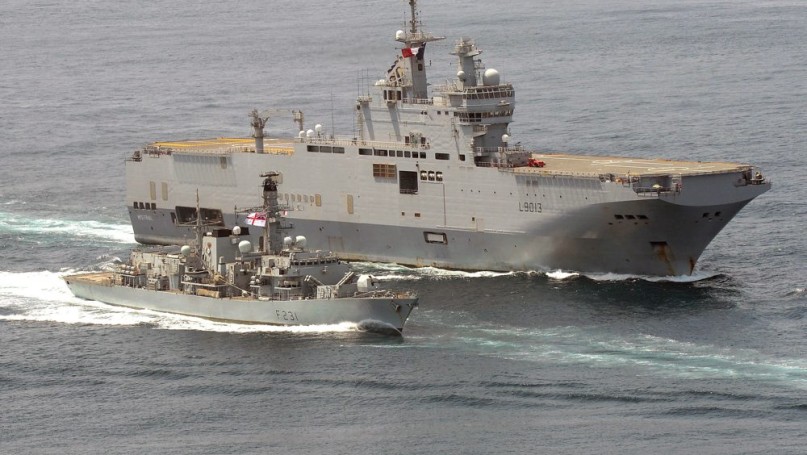
Russian aggression against Ukraine has had numerous ripple effects across the international community, and one is the instigation of unique drama regarding a three-year old contract for France to build and deliver two Mistral-class helicopter carriers to Russia. Since the Ukrainian crisis began, this contract has moved between markedly different states, but remained intact. While the West has decried France for maintaining the viability of this military agreement in the face of Russian belligerence, its reason for doing so is not easily dismissed: the incredibly conflicted but important desire to be both domestically and internationally responsible. What has resulted is an impressive balancing act of international law and foreign policy whereby France has flouted the terms of its contract with Russia, resisted completely appeasing its allies and domestic actors, but managed to keep all parties reasonably mollified.
It all began in 2011, when France signed the contract with Russia. Subsequently, in 2014, Russia moved against Ukraine and the West responded by implementing sanctions. While France originally defended the continuation of the contract by noting that the sanctions did not apply to it, as pressure mounted, France proposed withholding the second carrier. It then placed the contract on temporary hold pending further evaluation of the situation and stated that it would not hand over the completed carrier until Russia met certain conditions: a permanent ceasefire in Ukraine and roadmap for the settlement of the dispute. This prompted Russia to set a deadline of the end of November for the first carrier’s delivery or it would undertake legal action, which France rebuffed. Finally, French President François Hollande indefinitely suspended the contract.
France’s language and the stance it has taken are important. It has not cancelled the contract, nor realistically threatened to do so, even in the face of substantial diplomatic pressure from the international community, including NATO commanders. This is because the deal is worth approximately $1.6 billion, and France would be liable for repayment of the full amount to Russia plus, most likely, penalty fees for breach of contract. Moreover, the contract is responsible for the employment of hundreds of French workers. In an otherwise morose economy, the French defense industry is a rare bright spot. Preliminary data for France’s 2014 arms exports, in spite of the Russian situation, suggests a substantial increase over already impressive 2013 sales, from $7.75 billion to $9.5 billion. The sector, and the politicians in power, would take a substantial hit if the Mistral contract were cancelled.
Despite the importance of this contract, France has still been willing to suspend it. This is because standing opposed to a purely economic approach to the situation is the fact that France is currently decrying Russia for its military actions in Ukraine. Simultaneously delivering powerful military hardware would be quite hypocritical. In addition, France has been a consistent champion of human rights and the rule of law, and the principles of liberty, equality, and fraternity are firmly imbedded in the national consciousness. France’s allies have also been vocal in their requests that it scrap the deal given the current geopolitical situation.
When approached through the prism of France’s incompatible but significant interests in the Mistral contract, its balancing act between cancellation and delivery is quite understandable. In fact, France can be seen to be skillfully and simultaneously working in the best interests of its people and the international community by maintaining the viability of a lucrative deal while punishing Russia for its actions. Meanwhile, Russia has thus far held off on pursuing legal action against France since the contract, though suspended, remains intact.
There will, however, likely come a time when France must decide on which side of its precarious perch it falls. As it stands, the easiest route appears to be completion of the contract. France may use a reduction in tensions to go through with the deal and avoid financial penalties. It is unlikely that, barring a resumption of substantial Russian aggression, France will decide to terminate the contract. Meaningful aid from allies in mitigating economic harm or assured alternative buyers may, however, make cancellation viable.
For now, and until such time as a decision becomes necessary, France will continue to stand firmly infirm between domestic and international responsibility. While all sides – French industry, the international community, and Russia – are not happy with the current lack of assurance, their interests have been placated and France is largely fulfilling its obligations.
Further Reading on E-International Relations
- Opinion – Macron’s Pivot Towards Russia
- Russia’s Invasion of Ukraine and the Return of Civilisational Politics: An American and French Tale
- Opinion – The Myth of Being Anti-Racist and Anti-War in the Ukraine Conflict
- The Causes and Consequences of Russia’s Actions towards Ukraine
- Balancing in Central Europe: Great Britain and Hungary in the 1920s
- Opinion – UK-France Relations Under a Liz Truss Premiership